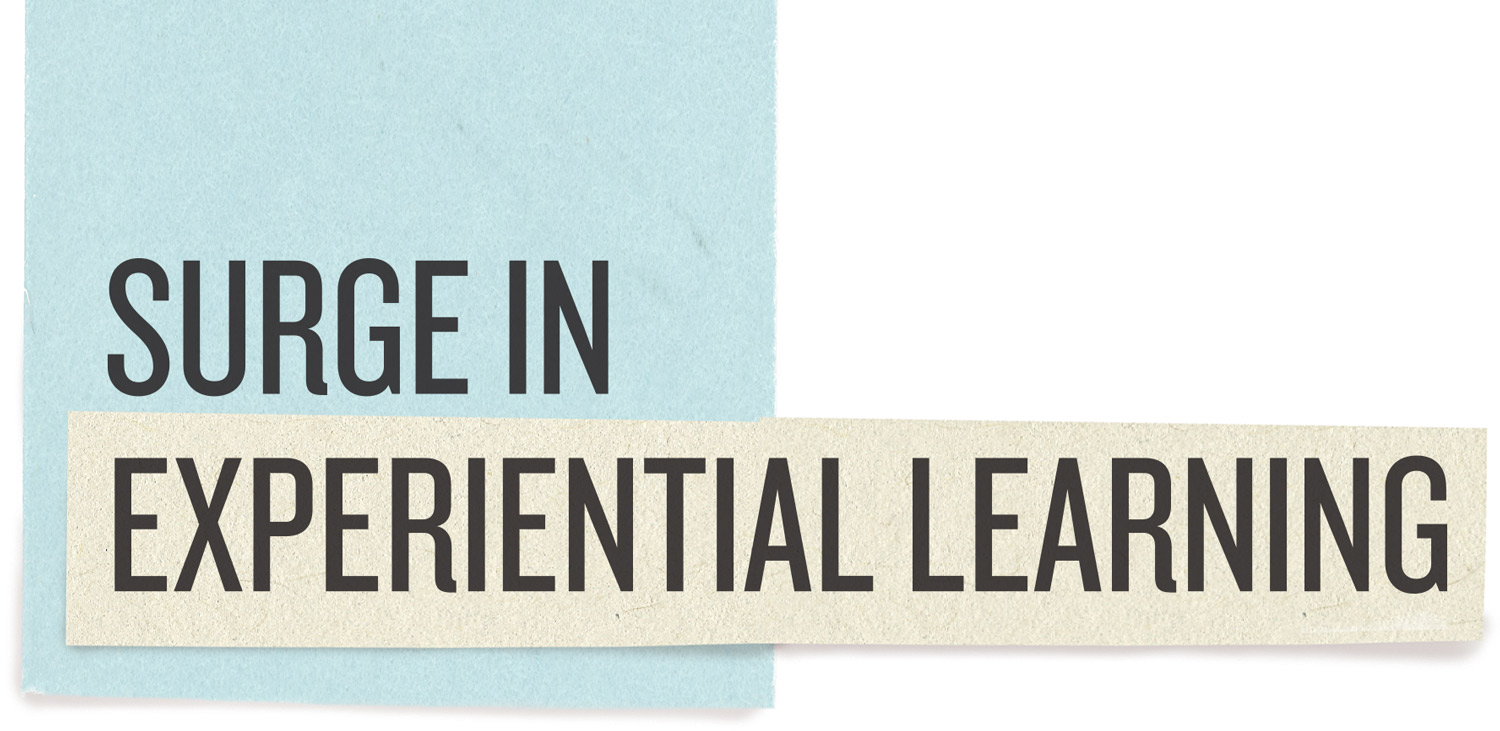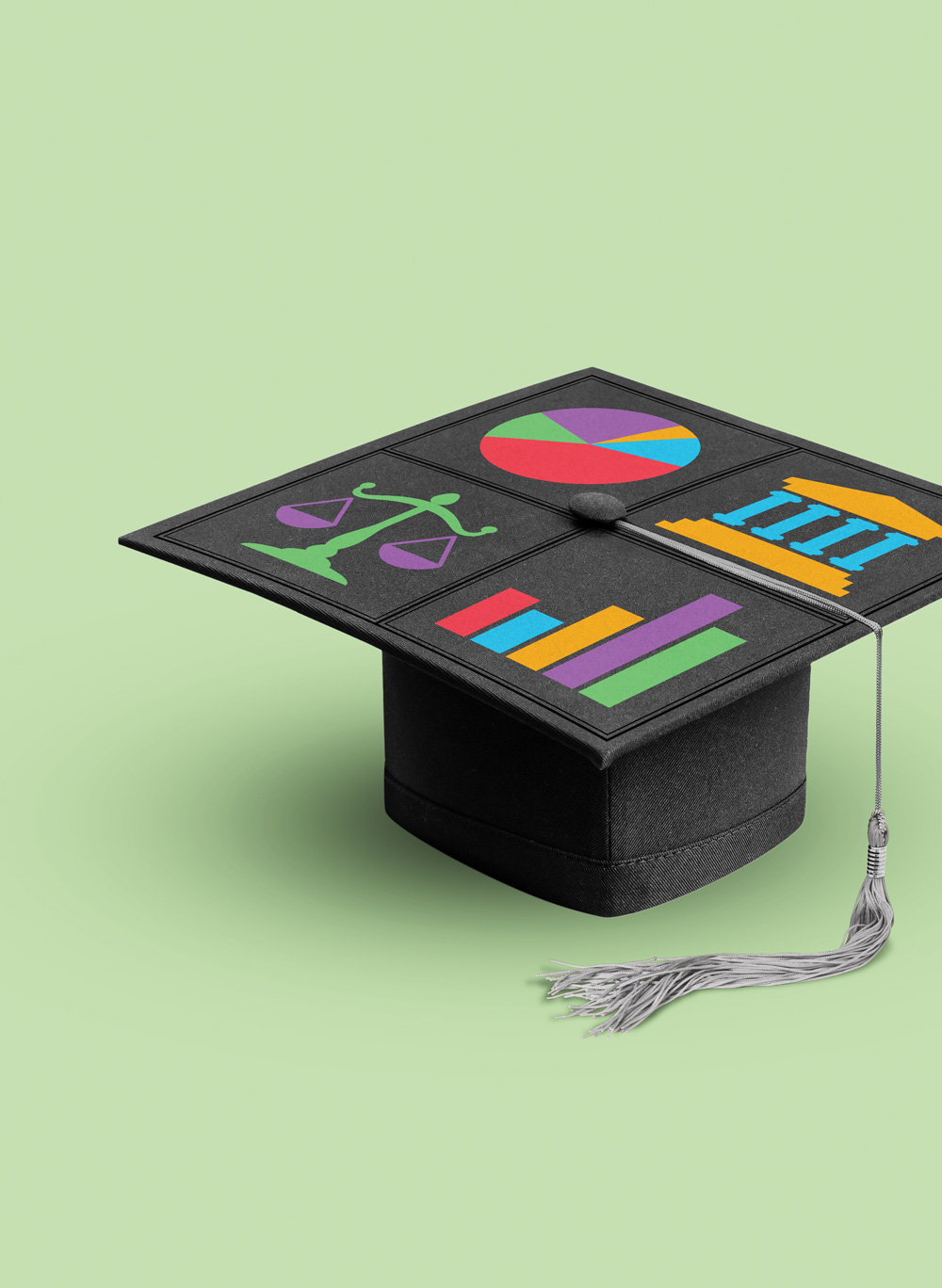
Surge in Experiential Learning
By Larry Teitelbaum

Surge in Experiential Learning

By Larry Teitelbaum

hen Eleanor Barrett L’05 was in law school, she had a thin catalog of experiential learning courses to choose from — a handful of clinics or appellate and trial advocacy classes.
The situation is far different today thanks to Barrett’s diligent efforts as Associate Dean for Curricular Affairs.
How about 132 experiential learning courses — from transactional to litigation to regulatory to soft skills such as legal writing and public speaking? Penn Carey Law students can now pitch venture capitalists for start-up funding in real time, practice challenges to administrative rules, and perform substantive work in judicial chambers during the semester.
Take externships alone. Since 2010, the number of students enrolled in externships each semester has increased from 10 to 67, including almost 30 students during the spring 2022 semester who worked with the Law School to create their own new and varied placements.
“It’s a big explosion,” said Barrett, who stepped down from her position at the Law School over the summer to become the Deputy Director of the American Law Institute. “Our students like these intense real-world experiences and have found them to be really meaningful.”
And that’s a good thing since the American Bar Association now requires law school students to earn six experiential credits as a condition for graduation.
Just as in clinical education years earlier, a movement took root to ramp up practical skills training, sparked, in part, by a seminal two-year study conducted by The Carnegie Foundation for the Advancement of Teaching. The study assessed the effectiveness of the law school curriculum and instruction in America and Canada during the 1999–2000 academic year.
The authors of the study recommended more emphasis on ethics and client service in addition to legal analysis, writing that lawyering should be integrated into the curriculum rather than treated as a subordinate area.
“Students need a dynamic curriculum that moves them back and forth between understanding and enactment, experience, and analysis,” the authors wrote, adding that “legal education should use more effectively the second two years of law school and more fully complement the teaching and learning of legal doctrine with the teaching and learning of practice.”
Barrett characterized the Carnegie Report as a major development in legal education, crystallizing gaps in law school training and stimulating discussion. But, she explained, the report and the accompanying movement to further integrate experiential learning into the curriculum actually came in response to students, alumni, and employers who pressed for better preparation for legal practice.
“I think it’s good to have both,” said Barrett, making a case for the combination of doctrinal study and experiential learning. “You need knowledge, and you need skills to be an effective lawyer.”

Why Wait for Graduation to Learn How to Start, Sell, and Save a Company

enevieve Shaw L’22, WG’22 and her team stood before a group of savvy venture capitalists in San Francisco and pitched their idea.
The law students-cum-entrepreneurs spoke with animation about the promise of their new robotic technology to increase crop yield and reduce reliance on workers in an industry plagued by labor shortages, laid out a market-driven plan to export the AI-based product to developing nations, and steeled themselves for a series of probing questions.
The content of their presentation in the shadow of Silicon Valley may have been fictional, but the intent was very real. Fifteen students in the yearlong JD/MBA Capstone class tracked the life cycle of a company with the goal of mastering the process inside and out in a culmination of the JD/MBA program at the University of Pennsylvania Carey Law School and the Wharton School.
When finished, they knew how to commercialize a product and get funding, how to negotiate the terms of a favorable merger and acquisition in the face of competitive bids, how to fulfill fiduciary duties, and how to restructure a distressed company without hemorrhaging value.
“Even if this was not a real company, we had to come up with a real pitch and a real story for why we needed funding, which made the class more tangible,” said Shaw, former Co-President of the JD/MBA Student Association.
The formula for the Capstone course: Take high-achieving students, place them in an environment where they test and expand their doctrinal skills through three experiential, hands-on sessions. Have students take their companies from conception to commercialization; from start-up to public company; from public company to unsolicited takeover; and from private company to distress and potential foreclosure. Mirror the real-world complexities they will encounter post-JD/MBA, and then release them into the worlds of law, business, banking, financial services, and consulting.
Sarah Pierce, the Denise A. Rotko Associate Dean for Legal Skills and Academic Director of the JD/MBA Program, put the program in perspective.
Traditionally, the JD/MBA Capstone Bootcamp involved a series of lectures and papers. Three years ago, the class moved to experiential mode. Students are divided into small teams. They discuss the core legal and business issues on a weekday and spend weekends on real-life scenarios and high-level negotiations as lawyers, founders, investors, bankers, and industry leaders lend their expertise and work collaboratively with students on solving a range of complex legal and business problems.
One of those professionals was Frankie Arvelo L’10, who co-taught the first session with Pierce on the startup and capital raising phase. Arvelo is General Partner at Arvelo PLLC, which counsels startup companies on the same kinds of issues that confronted the Penn Carey Law students in the entrepreneurship portion of the Capstone.
Arvelo delves into the nuts and bolts of starting a company, including developing a business plan and go-to-market strategy, finding and evaluating funding sources, raising capital, positioning the company for growth, and protecting founders.
“I wish this course had been available when I went to law school,” Arvelo said. “The way to become a better attorney is by doing. I’m glad the school is focusing on this and developing a skill set for dealmakers. It makes our graduates a lot more attractive to employers.”
Bryan Dinner L’22, WG’22 has certainly become a more marketable commodity to his employer: himself.
He didn’t wait until graduation to start an ed tech company. He founded Clarifi during his 1L year. The company provides productivity software that helps students with attention challenges complete their homework more efficiently and independently.
The class gave Dinner – who grew up with ADHD – the know-how to form a public benefit corporation, which, he explained, operates similarly to a C corporation but with the ability to explicitly include the educational interests of the students the company aims to serve in the Certificate of Incorporation.
This unique structure, created under a newer provision of Delaware law, helped to communicate Clarifi’s and Dinner’s educational commitment to families, educational partners, and funders, empowering Dinner to receive grant funding from the Jacobs Foundation, through their partnership with Penn and the Penn Graduate School of Education. The grant funds and foundations that have provided approximately $100k to jumpstart Clarifi may not have been interested otherwise in investing in a private company, Dinner said.
“It’s important to constantly learn the pitfalls you can face,” said Dinner, who plans to concentrate on building his business now that he has graduated. “If you misunderstand the term sheet and the control provisions, that’s going to come back to bite you later on.”
“The MBA may teach us to build company value,” Dinner added, “but the JD and this capstone in particular teaches us to capture and protect the value we are creating.”
No argument from Shaw, who will be joining BlackRock, the investment juggernaut. “The simulation and the experiential portion of the Capstone has been one of the most valuable courses I’ve had at both Wharton and the Law School,” said Shaw, who credits Pierce for transforming the Capstone into such a memorable experience. “The structure of the course allows us to combine our knowledge of corporate law with critical thinking.”
The Capstone ended with a visit to PJT Partners, a New York-based boutique investment bank and spinoff from Blackstone that advises companies in financial distress. The last session of the course, which took place in PJT offices, required students to find a path forward for the company as it faced debt defaults, regulatory hurdles, and shareholder suits.
The visit brought things full circle for Michael McGilvery L’20, WG’20, an associate in PJT Partners’ Restructuring Special Situations Group and former JD/MBA student who participated in the first reworked experiential Capstone class.
Two years removed from the class, and now steeped in the world of banking and finance, McGilvery reflects on what he’s learned, saying that he understands better than ever that business problems sometimes stem from a simple clash of personalities rather than facts on the ground.
Arvelo, who taught McGilvery, came away duly impressed by the students’ curiosity, perception, depth of intellect and determination to find solutions to problems no matter how difficult.
Pierce, creator of the course, concurs. “The students demonstrated time and time again an innate ability to skillfully tackle the most complex challenges. Extremely resourceful, they met every issue with a great deal of diligence and creativity, auguring well for the success that awaits them in whatever careers they endeavor to pursue.”

Unlocking the Secrets of the Administrative State, One Simulation at a Time

att Wiener says the exact number of federal agencies is unknowable — and he once led the Administrative Conference of the United States (ACUS), which is charged with improving the operations of the bureaucracy to protect the public interest.
If Wiener draws a blank, how are young lawyers supposed to work effectively in this environment and keep track of thousands of daily rules and regulations issued by the federal and state governments?
Here’s how: They can start getting up to speed during law school by taking Wiener’s class, “Administrative Advocacy,” a hands-on primer on how to interact, on behalf of clients, with the Office of Civil Rights, the Social Security Administration, the Securities and Exchange Commission, and scores of other federal bodies.
Depending on one’s specialty, Wiener said, lawyers need practical knowledge to contest proposed mergers, litigate enforcement actions, and decipher complicated tax law, all of which often come before administrative agency courts rather than the regular court system.
“What I try to do is focus on areas that students are most likely to practice in, and largely from the perspective of a private practitioner,” said Wiener, former head of the ACUS and Lecturer in Law at the University of Pennsylvania Carey Law School.
Wiener, who taught the class for the first time last spring (he is also teaching an administrative law course this fall), said in the simulated exercises students write memos, file Freedom of Information Act (FOIA) requests, and learn about decision-making power and politics at administrative agencies — “not something that students have a lot of exposure to in law school,” Wiener said.
Zach Persing L’22 found Wiener’s class compelling and useful. He took the course after studying administrative law with Cary Coglianese, Edward B. Shils Professor of Law and Professor of Political Science.
“I really liked the ability to take courses like this that built off my doctrinal studies,” Persing said. “The Law School has done a wonderful job of bringing in adjuncts and lecturers like Matt. When you’re in the field practicing, you get a different perspective.”
Jocelyn A.K. Walcott L’22, GEd appreciated the realism and practical nature of the course. “I see the class as being helpful right away,” said Walcott, former Editor in Chief of The Regulatory Review, which publishes regulatory news, opinion, and analysis under the aegis of the Penn Program on Regulation.
Walcott is clerking for two judges in the Middle District of North Carolina over the next two years, one of whom principally handles Social Security cases.
“I learned how important it is to be aware of the government’s position,” Walcott said. “To best advocate for your client, you need to know how the government is potentially constrained and also know when there is room for discretion.”
Gaughan has experience with administrative advocacy. During the summer of 2021, he had extensive exposure to administrative agencies, such as the Federal Reserve Bank, the Federal Deposit Insurance Corporation, and the National Credit Union Administration, as a summer associate at Sullivan & Cromwell, where he was assigned bank regulatory matters as a member of the General Corporate Group. Among his duties, he wrote letters to regulators — a skill he regularly burnished in the Administrative Advocacy class. “It gave me practice that informed my actual practice,” said Gaughan, who, after clerking for Chancery Court of Delaware Vice Chancellor Paul A. Fioravanti, Jr., intends to go into private practice and continue his regulatory work.
For the first assignment, the students, who represented a public school district, were asked to prepare a FOIA request to the Office of Civil Rights at the Department of Education requesting clarification on shifting federal policy regarding transgender individuals and bathroom use.
Other assignments included responding to a university investigation initiated by the National Labor Relations Board and filing a rulemaking comment to the Social Security Administration (SSA) on behalf of the National Association of Social Security Claimants’ Lawyers, who expressed concerns about a proposed rule that would eliminate the option of an in-person hearing before an administrative law judge and make video teleconferencing the default. The hearings are held to determine eligibility for disability benefits.
Prior to composing his letter to the SSA, Persing reviewed Rule 43 of the Federal Rules of Civil Procedure, a report on the legal considerations for remote hearings in agency adjudication, an ACUS recommendation on such hearings, and a letter from Congress opposing the change.
Citing congressional support for the existing system, Persing wrote that “relegating a claimant’s hearing to a computer screen violates basic norms of due process.”
Further, he wrote, video teleconferencing puts an added burden on clients with mental health challenges and may “frustrate communication between parties, attorneys, and decision-makers.” He also noted that federal courts, although not responsible for SSA policy and procedure, prefer in-person testimony.
Persing also made sure to compliment the agency, commending its commitment to efficiency.
Once Persing completed the simulation, based on a real case with a few factual tweaks, the instructor rendered a judgment.
“I can’t emphasize enough how thoughtful and detailed Matt’s comments were,” said Persing, who joined Sullivan & Cromwell this fall. “I learned a lot about nuances of substantive administrative law. It made me a better writer.”

With New Judicial Externships, Students Get to See How Law Develops

or the first time last year, the Law School provided students with a new opportunity to enrich their academic experience through judicial externships.
Given his interest in clerking, Noah Zimmerman L’23 got right on board.
Zimmerman spent the spring semester working for the Honorable Cheryl Ann Krause of the U.S. Court of Appeals for the Third Circuit. He got a taste of the experience … and loved it.
“Judge Krause was a terrific mentor. She made sure I had one-on-one projects with her where she would review my writing,” Zimmerman said. “I learned the importance of rigorous research. You learn that in law school, but it becomes even more important when you’re actually working for someone.”
The feeling is mutual. “The judges love our students,” said Eleanor Barrett L’05, who oversaw the program as Associate Dean for Curricular Affairs before stepping down over the summer to become Deputy Director at the American Law Institute. “They’re really welcomed and incorporated into the regular business of chambers.”
The school-year externship came in response to students who wanted to integrate judicial work into their regular studies, Barrett said. In the first year, eleven students took advantage, spending an average of 12 hours per week with judges and their clerks.
The new judicial externship is in the vanguard of a burgeoning externship program. Administrative Director of Curricular Affairs Rachel Mayover, who helps oversee the externship program, said 67 students enrolled for the spring semester, including 29 students who created their own ad hoc externships at, for example, Children’s Hospital of Philadelphia, the Federal Trade Commission, and the ACLU of Pennsylvania.
Elizabeth Pollman, Professor of Law and Co-Director of the Institute for Law and Economics, steered Juan Olavarria L’22 to his judicial externship. He took her Mergers & Acquisitions class and a seminar on Corporate Governance.
Olavarria ended up working for Vice Chancellor Morgan T. Zurn at the Delaware Court of Chancery. The Court of Chancery hears significant, high-profile corporate cases — just the ticket for Olavarria, who became interested in corporate law during law school and earned a Certificate in Management from Wharton.
“Working for Vice Chancellor Zurn really opened my eyes to how the law really develops,” Olavarria said.
Best part, he got to do real work. Olavarria reviewed filings, researched case law, and wrote bench memos. He was privy to discussions on the fiduciary duties of stakeholders, learned how corporate law applies to limited liability companies, and witnessed a major settlement hearing with accompanying arguments related to fatal Boeing plane crashes, all of which he saw as useful preparation for his entrance into corporate practice at Simpson Thacher in New York.
Ashlynn Dobbs L’22, a member of the Bankruptcy group at Weil Gotshal & Manges in New York, is ahead of the game due to her externship with the Honorable Jerrold N. Poslusny, Jr. of the U.S. Bankruptcy Court District of New Jersey.
She interned for Judge Poslusny during her 1L summer, but COVID-19 hindered her experience since she could not work in person. When another opportunity arose to do so through the judicial externship program, she jumped at the chance.
The judge, Dobbs said, had an open-door policy and encouraged questions. Dobbs drafted a decision and sat in on hearings, including a big bankruptcy case involving the Diocese of Camden.
Zimmerman also got his feet wet working on a variety of criminal and civil cases. Judge Krause and her clerks called upon Zimmerman to research state and federal law and document his conclusions. He said feedback from the clerks taught him to always be prepared to back up his judgments.
“I learned the importance of precise writing,” said Zimmerman, explaining that the externship furthered his interest in appellate advocacy.
A quarterfinalist in the Keedy Cup competition during the spring 2022 semester, Zimmerman will be clerking for the Honorable Richard D. Bennett of the U.S. District Court for the District of Maryland in 2023 and the Honorable Paul V. Niemeyer of the U.S. District Court of Appeals for the Fourth Circuit in 2024.
Barrett said students have been “sophisticated and thoughtful” about the role of externships in their legal training.
Added Mayover: “Students really want to get the practical experience. Our program has been highly successful. The feedback we get is universally positive.”
Mayover said she has no doubt that externship enrollment will continue to rise as students see the value in and importance of gaining practical experience before they graduate.